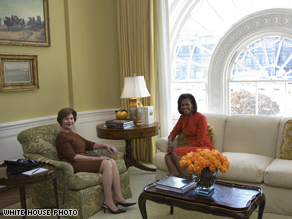Well elections have come and gone both in Canada and the US, but some are asking -- but what of the goal of advancing women in political leadership?
How long will it take us? We already are well into the fourth decade since the contemporary women's movement of the 1970s spawned a generation that sought to claim an equal place in the halls of power.

Women make up 52% of Canada’s population, yet we represent roughly 20% of elected politicians on municipal, provincial and federal levels. Currently Canada sits in
44th place in the world on the
Inter-Parlimentary Unions ranking of countries by representation of women in government. The breakdown is as follows:
Canada
Seats in the House of Commons - 308
Number of Seats held by Women: 65
Percentage - 21.1%
Seats in the Senate - 105 (90 currently sitting)
Number of Seats held by Women - 32
Percentage - 35.6%
Total - 24.4%

In
Still Counting, authors Linda Trimble and Jane Arscott argue that:
an “electoral glass ceiling” is keeping women at or below the 25 per cent mark, restricting women to less than half of the seats that would be theirs in a democracy committed to balanced, equitable and fair representation. Moreover, little is being done to address this ongoing democratic deficit. Despite drawbacks, such as the “revolving door” for female party leaders and continued sexism in legislatures, women can, and do, make a difference in politics. That’s why it’s important to elect many more, and more diverse, women to Canada’s parliament and legislatures.
In our most recent election, Prime Minister Stephen Harper
increased the amount of women his cabinet up from seven in the last session. Women now make up 29% of the cabinet, comparable to the ratio from Paul Martin's Liberal cabinet in 2003-04 (30%) and up from 22% in the last cabinet.
In the US, prior to 2008, the only female candidate to ever to run for national office on a major-party ticket, and was selected, not elected, as a vice presidential candidate was
1984 Geraldine Ferraro 24 years ago.
Both in the primary and the general election much has been
debated about both the
progress and
regression this election cycle has created for women. But even as the highest glass ceiling in American politics came the closest it ever has to being shattered, in Congress it was
business as usual: Women made a net gain of one seat in the Senate, bringing the total to 17 out of 100, and three seats in the House, moving up from 71 to 74 out of 435 seats, or 17%.
Not everyone thinks
this is good enough news though:
But what this means is that as the class of 2008 enters the Capitol's marble halls, it will include less than half the number of women who first won office in 1992 -- the so-called "year of the woman."
Currently the US sits in
71st place in the world with the follow breakdown:
United States
Seats in the House of Representatives - 435
Number of Seats held by women - 74
Percentage - 16.8%
Seats in the Senate - 100
Number of Seats held by women - 17
Percentage - 17%
Total - 16.9%
While these numbers are disappointing, there is some progress being made:
At the state level, the pipeline into federal office, there were some bright spots in 2008: A record number of women, 2,328, ran for state legislatures in a presidential election year, surpassing the previous presidential-year record of 2,302 set in 1992. (The overall record was set in 2006, when 2,429 women ran. More state legislative seats are up for election in non-presidential election years.)
“So 2008 was a record, and it managed to get us from 23.7 percent of women serving in state legislatures to 24.2 percent,” says Debbie Walsh, director of the Center for American Women and Politics at Rutgers University in New Brunswick, New Jersey.
Another bright spot emerged in New Hampshire, where women now hold a majority in the state Senate, 13 out of 24 seats – the first state legislative body in US history to be majority female. New Hampshire, and New England in general, has a history of electing women to office, owing to a tradition of citizen part-time legislators. In New Hampshire, the annual pay for legislators is $100, plus travel reimbursement.
Overall, when the totals of each state’s legislative bodies are combined, Colorado ranks No. 1 for female representation, with 38 percent. Vermont has 37.8 percent, and New Hampshire, 37.7 percent.
“Once we drop the decimal points, we know that women will have arrived,” writes former Vermont Gov. Madeleine Kunin in a blog. In an interview, she notes that the citizen-legislator model of her state is what allowed her to get into politics when her four children were young.
In contrast, South Carolina now has no women in its state senate.
On the higher end of the Inter-Parlimentary Unions list, Germany sits at 32% and Sweden at 47% - however no country in the world represents the female populace at 52% where it sits around the globe. So where does that leave us?
In Canada, we set a
record of success this election. And the US?
According to Marie Wilson, president of the White House Project, an organization working to advance women in leadership.
“At this rate, it will take us till 2063 to reach parity. I mean, come on! We have to speed things up.”
For more information on the advancement of women in politics, please visit
Equal Voice and
The Center for American Women in Politics


